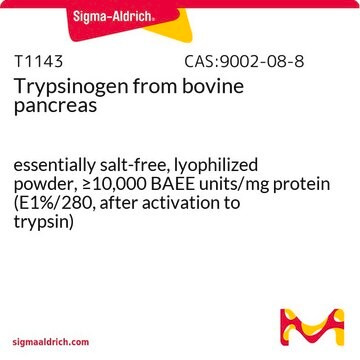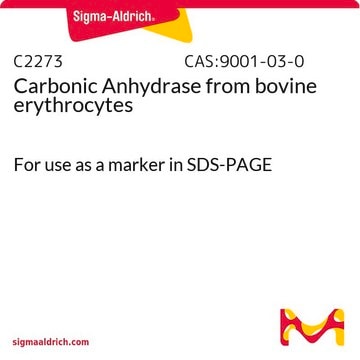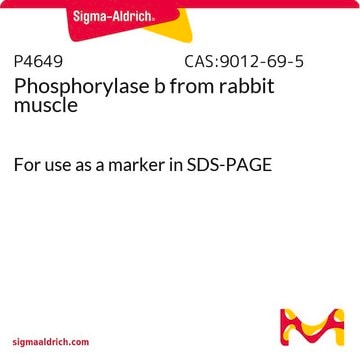T9011
Trypsinogen, PMSF treated from bovine pancreas
For use as a marker in SDS-PAGE
Sign Into View Organizational & Contract Pricing
All Photos(1)
About This Item
Recommended Products
biological source
bovine pancreas
Quality Level
form
powder
mol wt
~24 kDa
packaging
vial of 25 mg
application(s)
detection
storage temp.
2-8°C
Application
Trypsinogen, PMSF treated from bovine pancreas has been used as a non-phosphorylated control to analyze the phospho-protein α-casein from bovine milk by sodium dodecyl sulfate-polyacrylamide gel electrophoresis (SDS-PAGE). It has also been used as a molecular weight marker standard in SDS-PAGE.
Biochem/physiol Actions
Trypsinogen is a pancreatic proteinase and exists as isoenzymes 1 and 2. It is an inactive precursor of trypsin and gets activated by the enteropeptidase found on the brush border membrane of enterocytes in the duodenum. It is also known to proteolytically activate itself. Trypsinogen activation is associated with acute pancreatitis as it causes pancreatic enzyme cascade which activates the remaining zymogens leading to autodigestion of the neighboring tissue. Hereditary pancreatitis was shown to be caused by a Arg-His substitution at residue 117 of trypsinogen causing auto-activation of trypsinogen to trypsin.
Storage Class Code
11 - Combustible Solids
WGK
WGK 3
Flash Point(F)
Not applicable
Flash Point(C)
Not applicable
Personal Protective Equipment
dust mask type N95 (US), Eyeshields, Gloves
Certificates of Analysis (COA)
Search for Certificates of Analysis (COA) by entering the products Lot/Batch Number. Lot and Batch Numbers can be found on a product’s label following the words ‘Lot’ or ‘Batch’.
Already Own This Product?
Find documentation for the products that you have recently purchased in the Document Library.
D C Whitcomb et al.
Nature genetics, 14(2), 141-145 (1996-10-01)
Hereditary pancreatitis (HP) is a rare, early-onset genetic disorder characterized by epigastric pain and often more serious complications. We now report that an Arg-His substitution at residue 117 of the cationic trypsinogen gene is associated with the HP phenotype. This
Our team of scientists has experience in all areas of research including Life Science, Material Science, Chemical Synthesis, Chromatography, Analytical and many others.
Contact Technical Service






